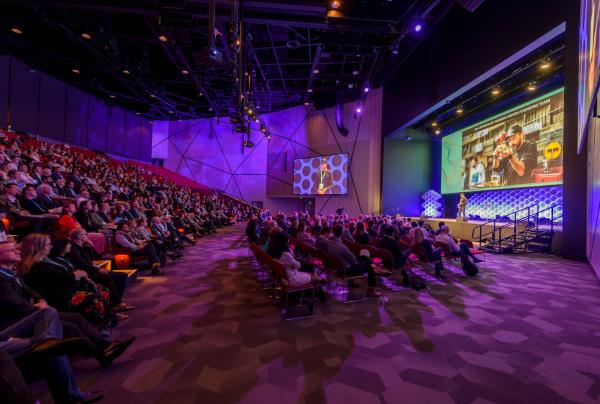
Industry leaders break down the barriers to holding a business event
Gathering in-person again is a goal many organisations are working towards, yet misconceptions around holding business events in a COVID-normal setting are stopping others in their tracks.
The recovery of Australia’s A$36 billion business events industry is already underway, led by forward-thinking organisations navigating the challenges of COVID-19 to plan and deliver safe, impactful in-person events.
Behind these events are experts in the field, demonstrating that meaningful connection and knowledge exchange is best achieved in a face-to-face environment.
Here, three event professionals break down common myths around planning COVID-safe events and why they can no longer stand in the way of achieving business success.

Ozwater 2021 Conference, Brisbane, Queensland © Simon Casson
MYTH: It’s too risky to hold a business event
With the health and safety of delegates the top priority for organisations, good communication and rigorous planning has become even more critical in conducting a COVID-safe business event.
Heath Campanaro, director of Imagination Australia, said attendee safety has always been front of mind for organisations. He says while “no brand wants to be associated with the next outbreak”, detailed contingency planning will ensure organisations have the highest level of confidence in their events.
“Certainly, from all the research we've been doing we're seeing confidence in the market, which is great, and confidence and a wish from clients to get back into events,” he says.
Heath says contingency plans could include back-up event teams in case the primary team is unable to attend and “go, no-go” scenarios in the event of a COVID-19 outbreak.
He says rigorous planning empowers clients to make an “informed and educated decision” about their business events.
Kate Smith, managing director of WALDRONSMITH Management, says extensive COVID-safe requirements are necessary, however they don’t have to compromise the overall event delivery.
WALDRONSMITH Management successfully hosted two major face-to-face business events in 2021. Kate says while the events required a “tremendous amount of additional work in terms of the COVID-safe management”, risk mitigation has always been a crucial part of any event.
“Many of the elements that we had to do for both of those events have, in fact, always been done in really good event management practice, such as communicating with delegates and stakeholders, ensuring you're managing expectations, as well as basic things like managing the entry and exit points, traffic management at lunch buffets, coffee stations or registration,” she says.
“While there was a layer of considerations and COVID protocol, there wasn’t any great compromise to the end product and I think that shows we can bring people together and, importantly, we can do it responsibly and safely.”
Kate says Australia’s commitment to a COVID-safe future, backed by high national vaccination rates, is also bolstering confidence among corporate clients.

Dreamtime 2017, Brisbane, Queensland © Remco Jansen
MYTH: It isn’t a necessity right now
While some businesses have put their events on hold during the COVID-19 pandemic, others are forging ahead with planning face-to-face gatherings.
Nick Millis, managing director, corporate of MCI Group, says the companies prioritising business events are getting the biggest return on investment.
“The organisations leading from the front are the ones that are getting the most success with retention of staff and talent, and they’re growing clients and customers. They know they simply can't continue to put the business on hold for any longer,” he says.
As organisations look ahead at their business strategy, Nick encourages organisations to think of events as a tool for growth and change, rather than a “nice to have”.
“Business events are about future planning, being agile and being able to transform. The face-to-face environment is actually the platform that leads to the growth of so many Australian businesses and associations,” says Nick.
“Events lead to business confidence, they lead to revenue generation, which then leads to the transformation and development of organisations.”

Opera Bar, Sydney © Destination NSW
MYTH: It can be done just as effectively online
Face-to-face events encourage a level of human connection that can’t be replicated online.
“You can pivot to a virtual environment but it will never replace what happens outside that main plenary room - the opportunities for networking, meeting new people, ideating and exchanging knowledge with people,” says Nick.
Heath says looking at Australia’s business events capabilities through a global lens can inspire organisations to plan for the future.
"London is a great example, they have major bookings all the way through the year. Confidence is there globally, so we should be just as confident,” he says.
“A combination of good planning, great communication and being able to share some valuable insight from our colleagues around the world is definitely helping clients feel more confident.”
Kate says the concerns around planning business events are far outweighed by the value of coming together in person.
"Event owners can now look ahead with much greater confidence and move forward knowing they can bring their event to life and really build success from there,” she says.
Nick believes the challenges of 2021 have only reinforced the pivotal role business events play in strengthening organisations and the broader economy.
“Corporate Australia really can no longer continue to hibernate,” he says.
“COVID-19 has provided the opportunity for corporations to tear up their existing event calendar and really look deep into how they're communicating their vision and values and start looking at their events completely differently.”
Feeling inspired? Learn more about holding your Event Here This Year.

















